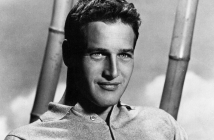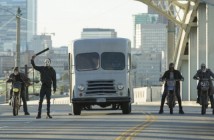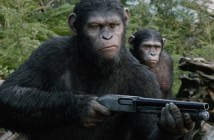 10. The Adventures of Robin Hood (1938), score by Erich Wolfgang Korngold
10. The Adventures of Robin Hood (1938), score by Erich Wolfgang Korngold
As romantic and rousing as the film itself, the Oscar-winning score of The Adventures of Robin Hood by the Austro-Hungarian Erich Wolfgang Korngold is a classical composer in the classical mold, his symphonic scores representing some of the best of what film fans now expect from lavish Hollywood productions of the 1930s and 1940s. His work generally supplements the film it is attached to while also existing as a legitimate symphonic composition when performed outside a cinematic context by an orchestra. In addition, the Robin Hood score in particular fits the many moods of the film to a tee, underlining the burgeoning love between Robin (Errol Flynn) and Marian (Olivia de Havilland) as equally well as the dramatic archery challenge and the climatic sword fight between Robin and his nemesis Sir Guy of Gisbourne (Basil Rathbone), despite Korngold’s apparent misgivings about writing music to merely illustrate action. In a fateful note, Korngold was persuaded to return to the US from Austria in order to compose and record music for Robin Hood just before Nazi Germany annexed the nation, so that Korngold claimed that the film saved his life.
9. Dead Man (1995), score by Neil Young
One of rock music’s most unpredictable, uncompromising artists collaborated with the idiosyncratic postpunk director behind Stranger than Paradise and Down by Law for 1995’s postmodern and psychedelic Western Dead Man. Neil Young improvised the music on electric and acoustic guitar, organ, and piano while watching the film, and so the instrumentals perfectly accompany the washed out, at times surreal environment of Jim Jarmusch’s film. The soundtrack album itself features dialogue and poetry read by star Johnny Depp from the works of his character’s namesake, William Blake, but the music easily stands on its own, as bleak and entrancingly otherworldly as the film itself. Typically overladen with dense, melodic feedback, Young’s compositions for Dead Man were in line with both his experimental work of the late 70s and 80s as well as his “Godfather of Grunge” phase immediately preceding this soundtrack work. The songs, conveniently titled “Guitar Solo, No. x” with “Organ Solo” the odd one out, mirror the repetitive landscapes of the film’s Western milieu, yet Young varies his style and intonation enough time to guarantee that his score can be powerful mood music even divorced from the film’s images. Young would collaborate again with Jarmusch for the concert and backstage film Year of the Horse in 1997.
 8. The Belly of an Architect (1987), score by Wim Mertens and Glenn Branca
8. The Belly of an Architect (1987), score by Wim Mertens and Glenn Branca
Although the collaborations between director Peter Greenaway and composer Michael Nyman are more plentiful and better known, I actually prefer the sweet-and-sour combination of Flemish Belgian composer Wim Mertens and American avant-garde guitarist Glenn Branca on the soundtrack for Greenaway’s film The Belly of an Architect. Although the director’s films are uniformly imposing, rigorously composed and seeped in art history and provocation, Belly has some of the most human elements to be found in his work, epitomized by lead actor Brian Dennehy’s descent into pain and paranoia as a commissioned architect losing his health and sanity. Mertens’s compositions are the more uplifting and pathos-driven elements of the soundtrack, moving and melodic and ably represented by the song titles “Struggle for Pleasure” and “Time Passing.” Branca’s more off-putting and inhuman contributions approach more the dominantly outsized Roman architecture that stand as silent reminders of Dennehy’s mortality, despite his attempts to stave it off through his art. It’s up to the ear of the beholder if these two seemingly conflicting styles productively stand side-by-side in the film, but I hear a perfect melding of sound and image, music and theme, for a film where the human strives for physical transcendence.
7. The Third Man (1949), score by Anton Karas
Viennese zither player Anton Karas was recruited by director Carol Reed during the shooting of The Third Man to compose a score for the film, a crime drama about disillusionment in the ruins of postwar Vienna. First-time composer Karas came up with an exceedingly memorable theme that immediately brings to mind the film and its environment, off-kilter, slippery, melodic. Karas even appears in the film playing his zither, an instrument most viewers outside Eastern Europe would have found alien both in sound and look, yet it lends an exotic quality to Holly Martins’s (Joseph Cotten) quest in the bombed-out city to his own heart of darkness in the form of old friend Harry Lime (Orson Welles). Few scores become so completely defining for the artist and genre: the zither and Karas became intimately intertwined, joining the film as one high-selling pop culture mass in the public consciousness, probably the first thing coming to mind when the instrument, the composer, or the film is mentioned.
6. Paris, Texas (1984), score by Ry Cooder
Foremost jack-of-all-trades guitarist Ry Cooder has been recording film soundtracks since 1970’s Performance, but for me his most powerful and resonant work is for the Wim Wenders-directed modern Western Paris, Texas. Like Dead Man above, the film was photographed by Dutch cinematographer and frequent Wenders collaborator Robby Müller, and the seemingly alien landscape and mix of realism and genre elements link the films as well. Instead of a feedback-heavy score like Neil Young’s, however, Cooder took to his roots used the blues standard “Dark Was the Night, Cold Was the Ground” by Blind Willie Johnson as a starting point for his poignant, lyrical slide-guitar work, integrating it into a minimalist space so much like the vast swaths of dust and wind that permeate the film. One can imagine the atmospheric soundtrack as echoing inside the head of the film’s lonely protagonist (Harry Dean Stanton) as he’s introduced wandering the desert, the score for his imaginary film of melancholy memories.
5. Lawrence of Arabia (1962), score by Maurice Jarre
Try listening to the Oscar-winning score to David Lean’s epic Lawrence of Arabia without envisioning vast expanses of desert, the piercing blue eyes of Peter O’Toole as enigmatic British officer T.E. Lawrence, and the siege of Aqaba. Can’t be done. Little-known composer Maurice Jarre was third choice for the major compositional undertaking, but he nonetheless successfully created beautiful, rousing themes for the dramatic, action-oriented scenes of the film and an uplifting theme for the internal quest Lawrence seems to take throughout the film. The full-length restored film begins with an astounding “Overture” combining all of its major themes, laying out the elements of warfare, nationalism, suffering, assurance, and history that serves as the background to Lawrence’s World War I experiences. David Lean’s films of this period, starting with 1957’s The Bridge on the River Kwai, rely so heavily on their scores by Jarre that they should be considered one of the most crucial director-composer pairs of their era.
4. Once upon a Time in the West (1968), score by Ennio Morricone
Although his pithy theme for The Good, the Bad, and the Ugly is perhaps more well known and certainly more heavily parodied, I think Ennio Morricone’s epic music for Sergio Leone’s 1968 follow-up Once Upon a Time in the West is superior, as mythic and outsized as the film itself. Doing for the very concept of the American West what Hitchcock and Herrmann did for the suspense thriller and Spielberg and Williams would do for spectacle, Morricone and Leone lay a bedrock sound for all future images in this vein. The film is a kind of final distillation of archetypes and motifs for the genre, and the music plays its role by developing themes for each character. Even the song titles (“The Transgression,” “The Man,” “Death Rattle”) have an elemental simplicity that makes the film itself feel like a final, enduring testament to its genre. Morricone and Leone would continue to collaborate, and Morricone would construct some magnificent scores in other genres, but their apotheosis of a Western is the clearest culmination of their work together.
 3. Vertigo (1958), score by Bernard Herrmann
3. Vertigo (1958), score by Bernard Herrmann
So iconic that its use in last year’s The Artist caused an uproar when Vertigo star Kim Novak dubbed its appropriation akin to rape, the intoxicating score for Alfred Hitchcock’s most mysterious, transfixing film is inseparable from the emotionally labyrinthine narrative of the film it’s wedded to. The run of collaborations between Herrmann and Hitchcock is a triumph of complementary image and sound, color and music, the diegetic and the non-diegetic. This most central of their works portrays retired detective Scottie Ferguson’s (James Stewart) descend into obsession and interiority, epitomized by his case of vertigo that accompanies several emotional shocks throughout the film. The hypnotic allure of Novak is further compounded for the viewer by Herrmann’s swirling strings and arresting horns, an off-balance mix of romance and mystery that is itself vertiginous. The music keeps the viewer locked in Ferguson’s headspace, even as the narrative veers around him and reveals itself without his knowledge. There are several different recordings out there of the Vertigo score: the original LP, an expanded CD version, and re-recordings performed by the Royal Scottish National Orchestra and the Paris Opera Orchestra.
2. Blade Runner (1982), score by Vangelis
One of the great science fiction films of all time has a magisterially brooding, melodic score composed by the Greek musician Vangelis, best known for the oft-parodied theme from Chariots of Fire. The score is immediately both as concrete and as dreamlike as the film itself, mirroring the futuristic expanse of Los Angeles in the opening moments. With a world so fully realized as Blade Runner‘s, the music fits in with the beeps and buzzes of the 2019 milieu as well as being convincingly noirish, as smoky and melancholy as one could hope for in such a technologically updated environment. The most underrated element of the film’s music is surely its moodily romantic side, full of seemingly anachronistic saxophone and most associated with unknowing android Rachel (Sean Young) and her emerging relationship with android-retiring detective Deckard (Harrison Ford). The original soundtrack to Blade Runner was notoriously never released for years after the film’s opening, causing many bootleg recordings to surface, but official releases did in fact occur in 1994 and in 2007, upon the film’s 25th anniversary.
 1. Elevator to the Gallows (1957), score by Miles Davis
1. Elevator to the Gallows (1957), score by Miles Davis
In truth, although Miles Davis is credited for the music and led his French touring band in what became the soundtrack album for Louis Malle’s debut feature Elevator to the Gallows, his entire ensemble deserves the kudos for its success since the music heard is almost wholly improvised, with only a plot synopsis and projections of the relevant scenes for guidance. And under these conditions, it’s no wonder that the slow-burn, noir-tinged crime drama derives so much of its loneliness and isolation from the its jazz score. The band’s music provides perfect background accompaniment to the film’s trajectory: the melancholy, doomed illicit affair between Jeanne Moreau and Maurice Ronet that opens the film is for a time overcome by the hot jazz associated with the two young car thieves. The foremost intersection of score and film probably occurs during the despondent, mournful nighttime wanderings of Moreau, where Davis’s trumpet sounds best in sync with the character’s psyche. Davis was already at that time one of the major international stars of American jazz, and his score was not only a coup for the French film but proved to be a crucial step in the evolution of his career and of jazz music in general towards the recording of the landmark Kind of Blue less than two years later.



